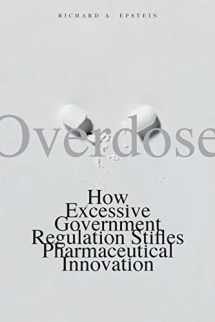
Overdose: How Excessive Government Regulation Stifles Pharmaceutical Innovation (Institute for Policy Innovation Books)
ISBN-13:
9780300143263
ISBN-10:
0300143265
Edition:
1
Author:
Richard A. Epstein
Publication date:
2008
Publisher:
Yale University Press
Format:
Paperback
296 pages
FREE US shipping
Book details
ISBN-13:
9780300143263
ISBN-10:
0300143265
Edition:
1
Author:
Richard A. Epstein
Publication date:
2008
Publisher:
Yale University Press
Format:
Paperback
296 pages
Summary
Overdose: How Excessive Government Regulation Stifles Pharmaceutical Innovation (Institute for Policy Innovation Books) (ISBN-13: 9780300143263 and ISBN-10: 0300143265), written by authors
Richard A. Epstein, was published by Yale University Press in 2008.
With an overall rating of 4.1 stars, it's a notable title among other
books. You can easily purchase or rent Overdose: How Excessive Government Regulation Stifles Pharmaceutical Innovation (Institute for Policy Innovation Books) (Paperback) from BooksRun,
along with many other new and used
books
and textbooks.
And, if you're looking to sell your copy, our current buyback offer is $0.3.
Description
This book is the first to offer a comprehensive examination of the pharmaceutical industry by following the tortuous course of a new drug as it progresses from early development to final delivery. Richard A. Epstein looks closely at the regulatory framework that surrounds all aspects of making pharmaceutical products today, and he assesses which current legal and regulatory practices make sense and which have gone awry. While critics of pharmaceutical companies call for ever more stringent controls on virtually every aspect of drug development and approval, Epstein cautions that the effect of such an approach will be to stifle pharmaceutical innovation and slow the delivery of beneficial treatments to the patients who need them. The author considers an array of challenges that confront the industry--conflicts of interest among government, academe, and the drug companies; intellectual property rights that govern patents; FDA regulation; pricing disputes; marketing practices; and liability issues, including those brought to light in the recent VIOXX case. Epstein argues that to ensure the continuing creativity, efficiency, and success of the pharmaceutical industry, the best system will feature strong property rights and clearly enforceable contracts, with minimal regulatory and judicial interference.


We would LOVE it if you could help us and other readers by reviewing the book
Book review

Congratulations! We have received your book review.
{user}
{createdAt}
by {truncated_author}


